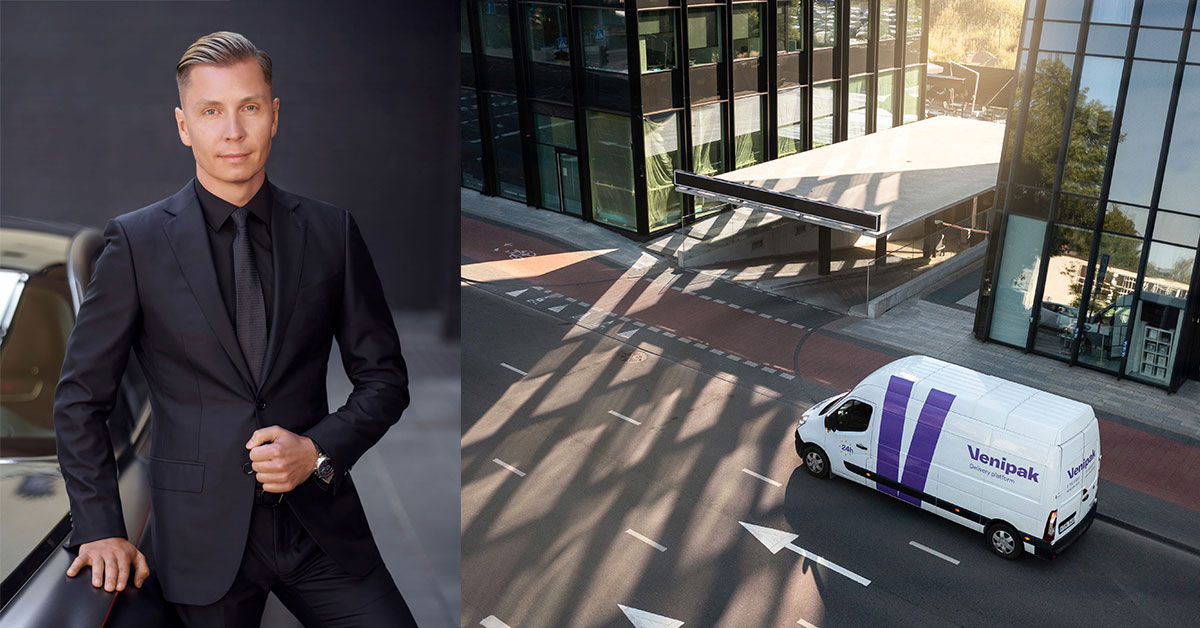Venipak, a Lithuanian parcel delivery company that started 20 years ago, has grown into an international company that plans to expand its network to 800 parcel machines in the Baltics this year and continues to strengthen its position in Western Europe. Nerijus Raudonis, founder of Venipak, talks about Venipak’s early years, its biggest challenges and its plans for the future.
Nerijus Raudonis, the founder and owner of Venipak, started his entrepreneurial career at the age of 20 in the video rental business. However, his interest in the parcel and logistics sector was sparked by a friend who worked for an international parcel delivery company. “Something clicked in our subconscious minds so in a café we took a napkin and drew a diagram of how it could be. Back then, there was no IT, no scanners, no documents or contracts – nothing to control the process or track deliveries,” he recalls.
So, it started: after selling the video rental outlets and borrowing money from the bank, the decision was made to start. “The competition was small, just a few players, so it seemed it would be a piece of cake, but it wasn’t – we had to overcome a lot of challenges to get to where we are today.”
A package company started with flour co-production
Raudonis remembers that the first steps in logistics were really difficult – there was a shortage of trucks, warehouses and couriers. However, a ray of hope came when a colleague found customers who needed help delivering flour to bakers. “This motivated us to move towards formal documentation – we made our first delivery note just for flour deliveries,” says Raudonis, who was working 16-18 hours a day at the time. The company soon had its first regular customer and set up a network of independent couriers.
The 2008 crisis brought new opportunities. “When everyone was saving money and looking for ways to survive in a slow economy, we found a niche – customers who could economise by outsourcing logistics. And it worked – we gained momentum in Lithuania, entered Latvia in 2010, and Estonia a year later. It took us a long time to break the ice in new markets.”
The first Venipak parcel vending machines were made by the Raudonis family on their own. “I come from a family of engineers, my father used to be the manager of a refrigerator factory. With his advice, we built parcel machines quickly and cheaply,” he said. Raudonis already had a vision of a common network of parcel vending machines that would connect all the players in the logistics market at the time, but although he tried to inspire others with the idea, no one took up the challenge.
Venipak installed its first parcel machines in Lithuania in 2011, but soon removed them because the market was not ready for them. Nonetheless, Raudonis believes that testing parcel machines was a good decision that led to improvements in the product. The network of parcel vending machines was sold to post offices in Kazakhstan and Hungary, and today Raudonis’ father’s company is one of the largest manufacturers of vending machines in Eastern Europe.
Pandemic sets new business direction
During the pandemic, demand for vending machines increased, but competition between service providers became much more intense. Venipak started to look for opportunities to expand beyond the Baltic countries and last year acquired a Dutch e-commerce wholesaler, which helped the company strengthen its position in Western Europe.
Today, Venipak has the only privately owned network of parcel machines in the Estonian market. The company operates as a delivery and commerce platform, providing a single source for cutting-edge e-commerce solutions. “Our aim is to connect Europe’s major markets and build a bridge that allows businesses to access all e-commerce portals where their goods can be accessed without restriction. In our eyes, this is an untapped and promising niche that can open up entirely new growth opportunities for business.”
Venipak has also expanded its market share in Estonia in recent years and has started cooperating with several large Estonian e-shops, such as Telia, Frog.ee and Osta.ee. Currently, Venipak has 160 parcel machines in Estonia and plans to expand its network this year in line with demand.
Deniss Osman, the head of Venipak Estonia, finds that the innovative spirit of the founder Raudonis is the company’s strength. “What started out as a courier service has grown over the years into a company that has found a way to differentiate itself in a very competitive sector. Contactless parcel delivery and offering a full service to e-commerce companies are just a few examples of how Venipak adds value to its customers.”
No plans to sell shares
Raudonis discloses that every year he receives offers to sell his shares at increasingly higher prices, but he is not considering such a possibility. “I have always dreamed of an IPO, the whole structure of the company is set up to move in that direction. If we ever get to that point, we won’t necessarily be just a courier service anymore.”
He regards selling shares in the logistics business as meaning becoming part of a large body, losing your freedom, and becoming a wage earner: “It is not my vision. Our advantage is fast decision-making and zero bureaucracy. We can react to change quickly, we are flexible, and this creates the potential for even faster growth in the future.”
“I have three sons, and I want to teach them how to manage their personal finance rather than entrepreneurship. Money management is the most important business in the world, and if you know that, you’ll always find companies worth investing in and earn a return on your investment. The most important thing is to inspire yourself, find the strength inside, read a lot, and be interested.”
